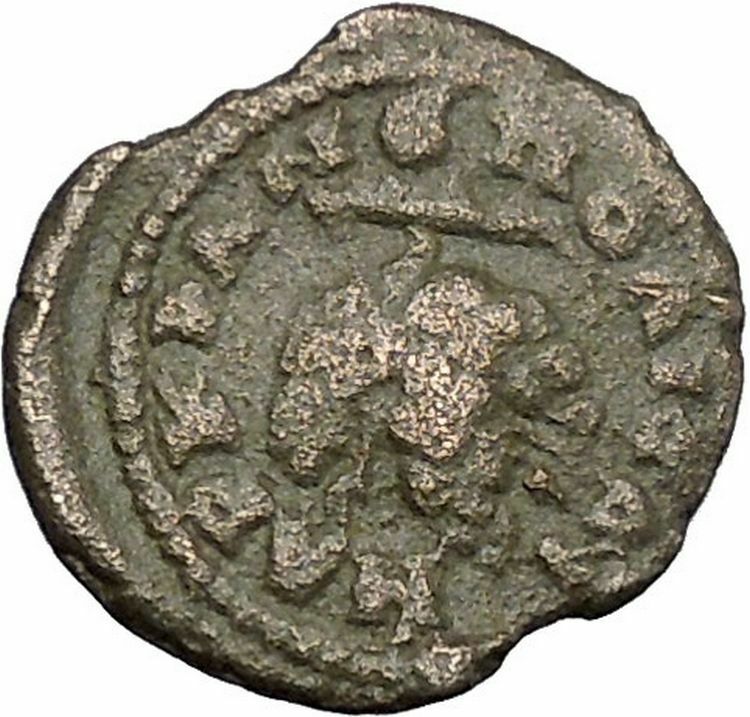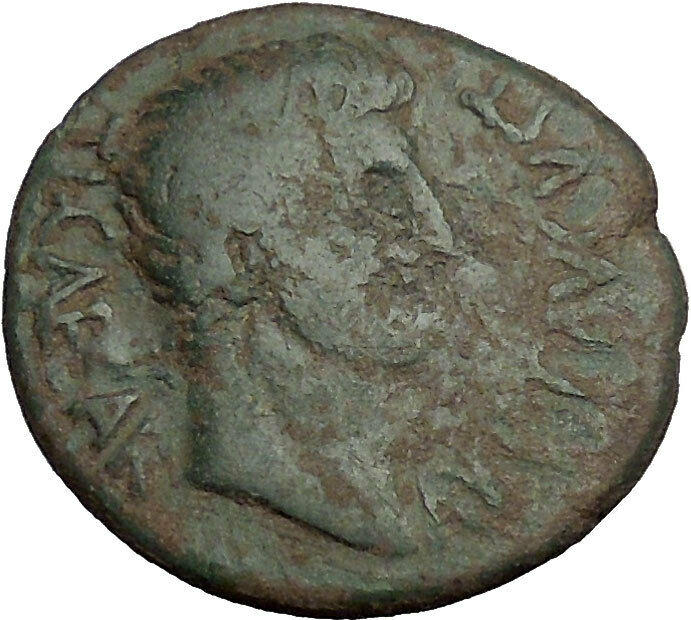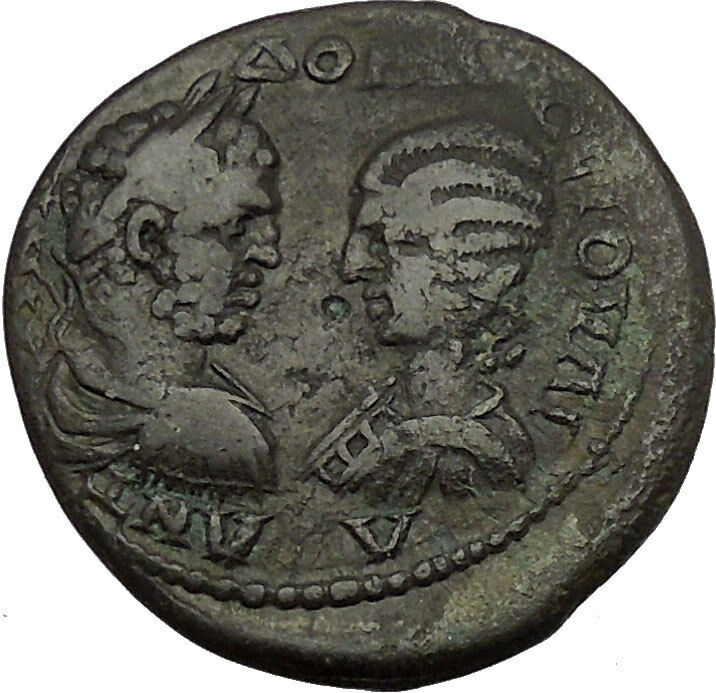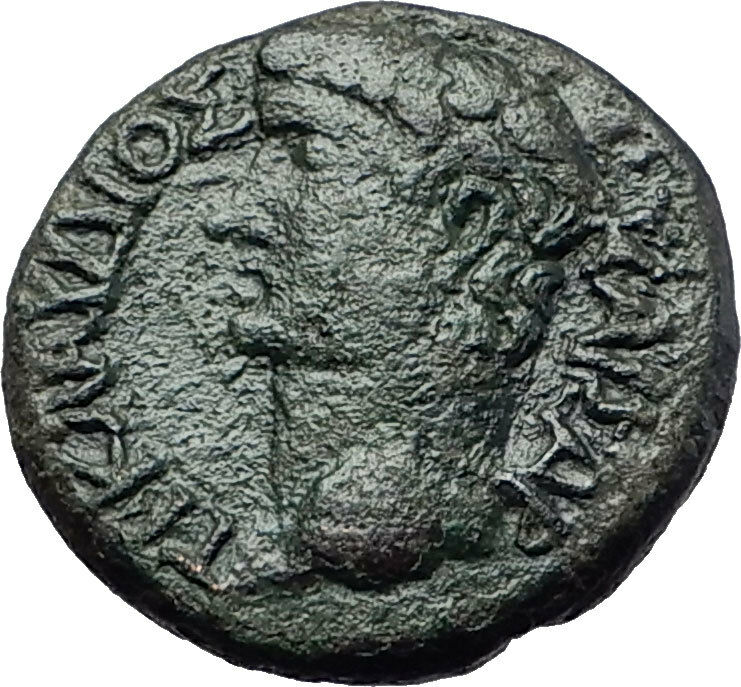|
Otacilia Severa – Roman Empress: 244-249 A.D wife of Emperor
Philip I –
Bronze 22mm (7.68 grams) of Deultum in Thrace
Reference: Jurukova 525; Varbanov 3063
M OTACILIA SEVERAE AVG, diademed draped bust right.
COL FL PAC DEVLT, Apollo, naked standing facing, head right, right hand raised
over his head, holding bow in left hand; to right of him is a tree trunk with a
serpent coiling up it.
You are bidding on the exact item pictured,
provided with a Certificate of Authenticity and Lifetime Guarantee of
Authenticity.
Debelt is a village in
Sredets municipality
in
Burgas Province
in southeastern
Bulgaria
, about 25 kilometers from
Burgas
. It has a population of 1,574 and an
altitude of 46 meters. The village was founded around the 2nd century by the
Roman emperor Vespasian
. Then called Deultum, it was the only
Roman colony on Bulgarian land in the
Flavian dynasty
. During the Byzantine era it
was known as Develtos (Greek:
Δεβελτός).

In
Greek
and
Roman mythology
, Apollo
,
is one of the most important and diverse of the
Olympian deities
. The ideal of the
kouros
(a
beardless youth), Apollo has been variously recognized as a god of light and the
sun; truth and prophecy;
archery
;
medicine and healing; music, poetry, and the arts; and more. Apollo is the son
of Zeus
and
Leto, and has a
twin
sister, the chaste huntress
Artemis
.
Apollo is known in Greek-influenced
Etruscan mythology
as Apulu. Apollo was worshiped in both
ancient Greek
and
Roman religion
, as well as in the modern
Greco
–Roman
Neopaganism
.
As the patron of Delphi
(Pythian Apollo), Apollo was an
oracular
god — the prophetic deity of the
Delphic Oracle
.
Medicine and healing were associated with Apollo, whether through the god
himself or mediated through his son
Asclepius
,
yet Apollo was also seen as a god who could bring ill-health and deadly
plague
as well as one who had the ability to cure. Amongst the god’s
custodial charges, Apollo became associated with dominion over
colonists
, and as the patron defender of herds and flocks. As the leader of
the Muses
(Apollon
Musagetes) and director of their choir, Apollo functioned as the patron god
of music and poetry
.
Hermes
created
the lyre
for him,
and the instrument became a common
attribute
of Apollo. Hymns sung to Apollo were called
paeans
.
In Hellenistic times, especially during the third century BCE, as Apollo
Helios he became identified among Greeks with
Helios
,
god of
the sun
, and his sister Artemis similarly equated with
Selene
,
goddess
of the moon
.
In Latin texts, on the other hand, Joseph Fontenrose declared himself unable to
find any conflation of Apollo with
Sol
among the
Augustan poets
of the first century, not even in the conjurations of
Aeneas
and
Latinus
in
Aeneid
XII
(161–215).
Apollo and Helios/Sol remained separate beings in literary and mythological
texts until the third century CE.
The immense issues of coinage made in the name of Alexander
the Great for a topic which could occupy the pages of a large volume. Obviously
it is not possible, in a work of this scope, to do justice to such a subject. As
in the case of Philip II, coinage in the name of Alexander continued long after
the king’s death. No doubt this was largely due to the lack of an effective
successor to the imperial throne. Almost two decades were to elapse before
Alexander’s generals, his true successors, felt sufficiently secure to take the
title of ‘king’ and to issue coinage in their own names. Although he began his
career as King of Macedon, Alexander spent only the first two years of his reign
in his native kingdom, and by the time of his death, at the age of thirty three,
he ruled a vast empire stretching from Greece to India. Consequently, his
coinage was on an imperial scale, unlike those of his predecessors, and was
struck at a multitude of mints in many lands, often replacing an existing
autonomous series. nevertheless, the Macedonian mint of Amphipolis remained one
of the principal sources of currency. In later ages (3rd-2nd century B.C.) the
types of Alexander’s silver coinage were revived by various cities as they
regained a measure of autonomy from the declining Hellenistic Monarchies.
Marcia Otacilia Severa or Otacilia Severa was the Empress of
Rome and wife of
Emperor
Marcus Julius Philippus or
Philip the Arab
who reigned over the
Roman
Empire
from 244 to 249.
Severa was a member of the ancient
gens
Otacilius
who were people of consular and senatorial rank. Severa’s father was Otacilius
Severus or Severianus, who served as Roman Governor of
Macedonia
and Moesia
, while her mother was a member of gens
Marcius
or
was related to the gens. According to sources she had a brother called
Severianus, who served as Roman Governor of Lower
Moesia
between
246-247.
Little is known on her life before marrying Philip. In 234, Severa married
Philip who served in the
Praetorian Guard
under Emperor
Alexander Severus
. Severa had two children with Philip: a son named Marcus
Julius Philippus Severus or
Philippus II
(born in 238) and – according to numismatic evidence – a
daughter called Julia Severa or Severina, who is never mentioned by the ancient
Roman sources.
In February 244,
Gordian
III
was killed in Mesopotamia. There is a possibility that Severa was
involved in a conspiracy to murder Gordian. Philip became the new emperor who
gave his young predecessor a proper funeral and his ashes were returned to
Rome for burial.
Philip gave Severa the honorific title of Augusta. Their son was made
heir of the purple. Sometimes Severa and Philip are considered as the first
Christian imperial couple, because during their reign the persecutions of
Christians had ceased and the couple had become tolerant towards the faith of
the Christians. Through her intervention, she saved Bishop and Saint
Babylas of Antioch
from persecution.
In August 249, Philip had died in battle in Verona and
Decius (emperor)
became the new emperor. Severa was in Rome that time. When
the news of Philip’s death had reached Rome, Severa’s son was murdered by the
Praetorian Guard
. The child died in her arms. Severa survived her husband
and son and lived later in obscurity. Her later life is unknown.
|









